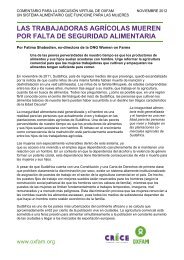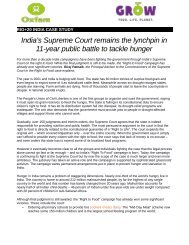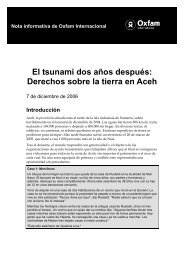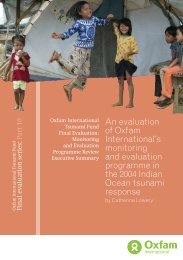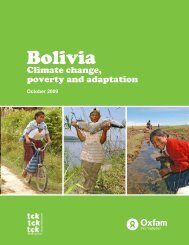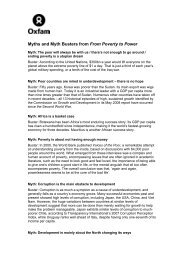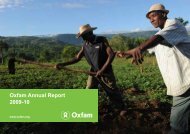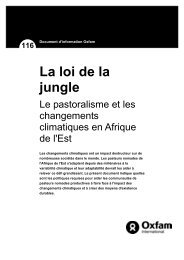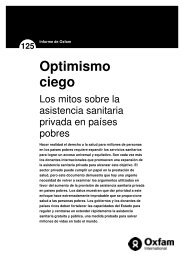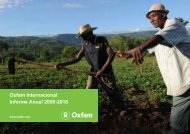Trading Away Our Rights - Oxfam International
Trading Away Our Rights - Oxfam International
Trading Away Our Rights - Oxfam International
Create successful ePaper yourself
Turn your PDF publications into a flip-book with our unique Google optimized e-Paper software.
EPORT final 19/1/04 10:20 am Page 86Good initiatives in sourcingand purchasing practicesSome companies have recognised and startedto tackle some of the problems created by theirpurchasing practices. On a wider scale, thefollowing initiatives could help to bringsignificant improvements in employment andworking conditions:Reviewing ordering processes: the Swedishfashion retailer, H&M, is reviewing its ownordering practices after several months ofexcessive overtime in two suppliers’ factoriesin China and Turkey. ‘There are so many peopleinvolved here at H&M – technicians, qualitycontrol, merchandisers, and compliance –that no one in our company has the full pictureof how the orders went from beginning to end,’said Ingrid Schullstrom, Manager of CorporateSocial Responsibility. ‘So we are reviewing whathappened during those months – were there lateapprovals or fabric delays or quality problems?Were we part of the problem here? We need tounderstand the full picture and then workinternally and with our suppliers towards asustainable solution.’ 5 Marks and Spencer, amajor UK retailer, is far into this process of‘critical path management’ for its garmentsupply chains. ‘One major reason for longhours in factories is poor production planning –and responsibility for that starts back with us,’said Muriel Johnson, Head of SocialCompliance. In early 2003 the companyenhanced its online database for tracking thestatus of worldwide orders, by including keydates and responsibilities for making internaldecisions, to ensure that producers’ lead timesare not cut short. 6Priority to approved producers: Premier Brandssells tea to several UK supermarkets, sourcedfrom more than 150 estates in 12 countries.By building long-term relationships withproducers and paying for the social audits, thecompany is moving towards buying only fromapproved producers. ‘Five years ago, around60 per cent of our suppliers were approved –today it is almost 90 per cent,’ said MichaelPennant-Jones, Ethical Sourcing Manager.‘And getting on our approved supplier list actsas a carrot for producers to raise their labourstandards.’Working with global unions: in 2001, thebanana company, Chiquita, signed an internationalframework agreement with the<strong>International</strong> Union Federation (IUF) for foodand agriculture. The agreement creates aforum for addressing workers’ rights violationsarising in the company’s worldwide operationsand supply chains. ‘Multinational companiesmake strategic decisions at the global level, butmost refuse to accept global responsibility forindustrial relations,’ said Peter Rossman,Communications Director at the IUF. ‘That iswhy agreements like this one are a valuable toolfor bringing industrial relations into the newenvironment of globalised production.’ 7Supply chain transparency: in 2002, more than20 major clothing retailers in Australia,including the Cole Myers Group (with Targetand Kmart) and David Jones, signed up to acode for ethical retailers, and now provide theAustralian clothing and footwear union,TCFUA, with details of their in-countrysuppliers, prices paid, and turn-around timesdemanded. Linking this to information fromsuppliers and producers who have likewisesigned up to codes, the union now hasdetailed and current data on these supplychains. Although the agreement covers onlyclothing made in Australia, it is an importantprecedent for greater transparency onpurchasing practices. 8National governmentsProtect the rights of workers by ensuring that labour legislation consistent withinternational labour standards is enacted, implemented, and enforced. In order,especially, to ensure that women’s jobs in global supply chains are empowering,not precarious:• Ensure that all workers can, in practice, join trade unions and bargain collectivelywithout fear or reprisal.• Extend labour-law protections and benefits to cover all categories of workers so that,for example, temporary and homeworking contracts are not misused to avoid payingbenefits.• Strengthen laws and policies concerning sexual harassment, health and safety at work,and maternity and childcare provision to reflect women workers’ specific needs.• Strengthen labour inspectorates and worker complaint mechanisms so that they aremore responsive to the challenges facing women workers.• Ensure that domestically registered companies, including mid-chain suppliers,conduct their international business operations in ways that respect workers’ rightsin law.The ILO and the WTO• Member governments should increase their funding and support to the ILO, in orderto strengthen its supervisory and capacity-building role in supporting national effortsto comply with ILO conventions.• The WTO must acknowledge that trade rules do not have primacy over internationalhuman rights and labour conventions, and that legitimate ILO-endorsed tradesanctions – such as in the case of Burma – cannot be challenged as an unacceptablebarrier to trade under WTO rules.• Coordination between the ILO and WTO should be formally strengthened to addressthe relationship between trade rules and workers’ rights and livelihoods.• The WTO’s Trade Policy Reviews should include reports, produced by the ILO,on the impact of trade rules and practices on employment standards, and inparticular on women workers. In the mean time, <strong>Oxfam</strong> welcomes the initiativeof the ICFTU in submitting reports on these issues.8687



